Jeu des 7 Familles by J.J.F
“Jeu des 7 Familles” by Jeux et Jouets Français of Paris, 1904.
Jeu des 7 Familles by Jeux et Jouets Français
French Happy Families games, or “Jeu des 7 Familles” tend to have extended families of six members stretching across three generations, making a total of 42 cards. Playing the game encourages observation and memory skills. The set shown here was made by Jeux et Jouets Français of Paris, who continued to make games until 1931. These cards are quite early, probably around 1910 and are one of a series of games in similarly styled boxes. The family trades depicted are: Lafleur (gardeners), Latourte (bakers), Lahure (butchers), Ducordon (caretakers), Lempeigne (shoemakers), Rapineau (artists) and Rémifat (musicians).
The rules were provided on a separate sheet→
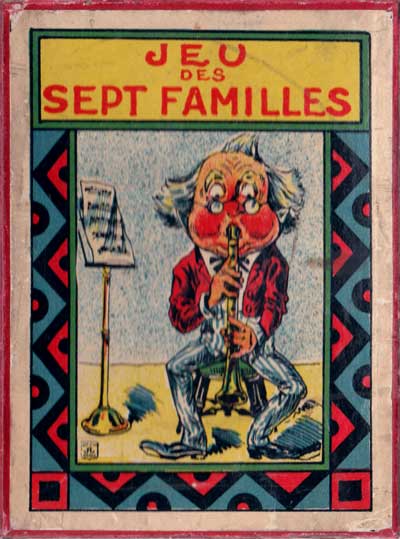
On the Grandfather Cobbler and the Daughter Cobbler cards are portraits on the wall behind them. These concern the French President at the time, illustrations representing Fallières, President of the Republic from 1906 to 1913, and Nicolas II (whom Fallières had met in 1909 in Cherbourg). See close-up here►
Above: “Jeu des 7 Familles” by Jeux et Jouets Français, Paris, c.1910. 42 cards in box with rules. The backs are plain blue colour. Images courtesy Rex Pitts.
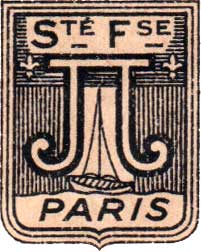
The small logos found on game boxes change over time, becoming less elaborate. We have no information regarding dates for each version.

Above: assorted logos used by Jeux et Jouets Français, Paris, 1904-31.
This game was republished by Miro Company►
By Rex Pitts (1940-2021)
United Kingdom • Member since January 30, 2009
Rex's main interest was in card games, because, he said, they were cheap and easy to get hold of in his early days of collecting. He is well known for his extensive knowledge of Pepys games and his book is on the bookshelves of many.
His other interest was non-standard playing cards. He also had collections of sheet music, music CDs, models of London buses, London Transport timetables and maps and other objects that intrigued him.
Rex had a chequered career at school. He was expelled twice, on one occasion for smoking! Despite this he trained as a radio engineer and worked for the BBC in the World Service.
Later he moved into sales and worked for a firm that made all kinds of packaging, a job he enjoyed until his retirement. He became an expert on boxes and would always investigate those that held his cards. He could always recognize a box made for Pepys, which were the same as those of Alf Cooke’s Universal Playing Card Company, who printed the card games. This interest changed into an ability to make and mend boxes, which he did with great dexterity. He loved this kind of handicraft work.
His dexterity of hand and eye soon led to his making card games of his own design. He spent hours and hours carefully cutting them out and colouring them by hand.

Leave a Reply
Your Name
Just nowRelated Articles
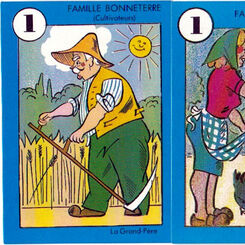
Bass & Bass Jeu des Familles
Bass & Bass ‘Jeu des Familles’ made by Franz-Josef Holler, Münich, 1989.

Jeu de Quaternes ‘Rizá’
Jeu de Quaternes ‘Rizá’

La Belle au bois dormant
Sleeping Beauty card game published in France, c.1980s.
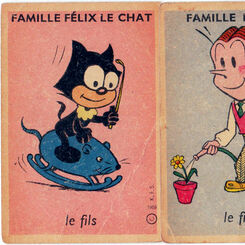
Jeu des 7 Familles
Jeu des 7 Familles © K.F.S. Opera Mundi c.1960.

Spears Happy Families
Spears Happy Families.
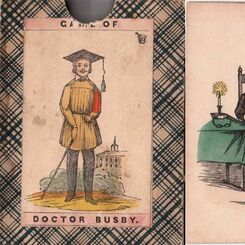
Doctor Busby
“Game of Doctor Busby“- anonymous manufacturer, c.1850.
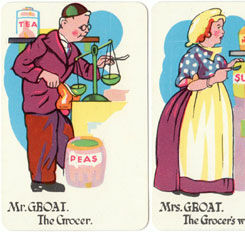
Happy Families, c.1950
Chad Valley “Happy Families” card game, c.1950.
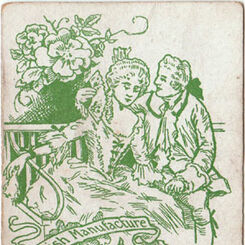
Happy Families, c.1930
“Happy Families” game published by Chad Valley c.1930 drawn in the slightly grotesque style of the V...
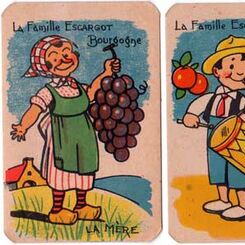
Familles Provinciales
Jeu des 7 Familles Provinciales printed by Nisse, Croix-Lille, c.1930
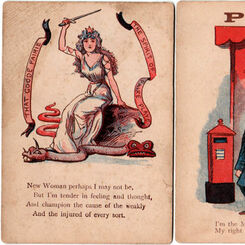
District Messenger
District Messengers were uniformed young men wearing little pill-box hats and mounted on bicycles wh...

Happy Families
Happy Families designed by A.E. Kennedy, 1930s.

Busy Families
C. W. Faulkner’s “Busy Families”, c.1903.

Pierre l’Ebouriffé
Heinrich Hoffmann (1809-1894) wrote the Struwwelpeter stories in 1847 for his son Carl. The stories ...

Chamborama
This “Jeu de Familles” from the 1960s designed by Jean Bachès promotes Chambord glassware.
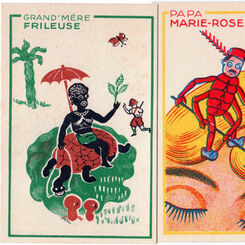
Laboratoires Modernes
Happy Families game by “Laboratoires Modernes” promoting herbal products, c.1929
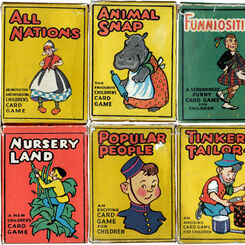
Waddy Productions
Waddy Productions Ltd was a member of the giant Amalgamated Press group and only published card game...
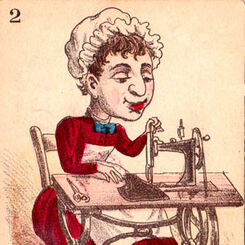
Mauclair Dacier Familles
This “Jeu de Sept Familles” was produced by Mauclair Dacier in the late 19th century.

Marché 7 Familles
“Marché 7 Familles” Happy Families card game published by France Cartes
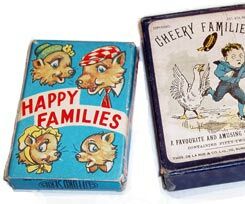
Happy Families
Happy Families is probably one of the most popular card games ever invented, with educational benefi...
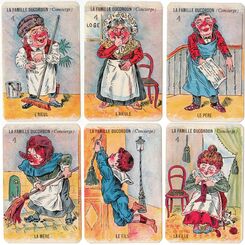
Jeu des 7 Familles by Miro Company
Jeu des 7 Familles by Miro Company, c.1960.
Most Popular
Our top articles from the past 60 days









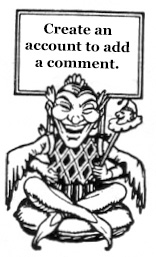 Your comment here. Your comment here. Your comment here. Your comment here. Your comment here. Your comment here. Your comment here. Your comment here. Your comment here. Your comment here. Your comment here. Your comment here. Your comment here. Your comment here. Your comment here. Your comment here. Your comment here. Your comment here. Your comment here. Your comment here. Your comment here. Your comment here. Your comment here. Your comment here. Your comment here. Your comment here. Your comment here. Your comment here. Your comment here. Your comment here. Your comment here. Your comment here.
Your comment here. Your comment here. Your comment here. Your comment here. Your comment here. Your comment here. Your comment here. Your comment here. Your comment here. Your comment here. Your comment here. Your comment here. Your comment here. Your comment here. Your comment here. Your comment here. Your comment here. Your comment here. Your comment here. Your comment here. Your comment here. Your comment here. Your comment here. Your comment here. Your comment here. Your comment here. Your comment here. Your comment here. Your comment here. Your comment here. Your comment here. Your comment here.




















